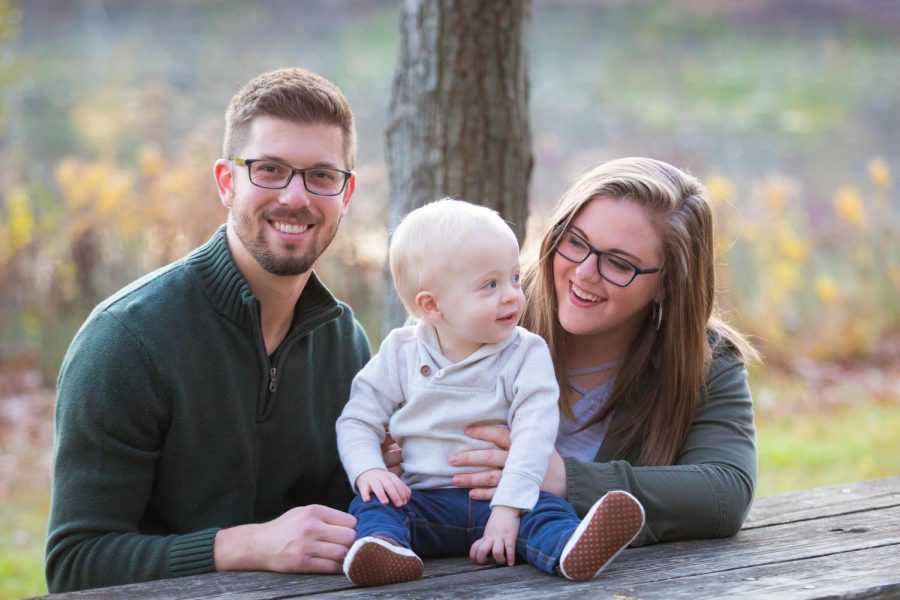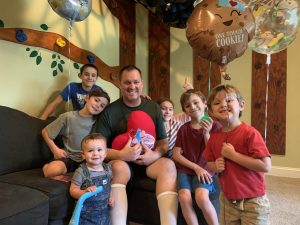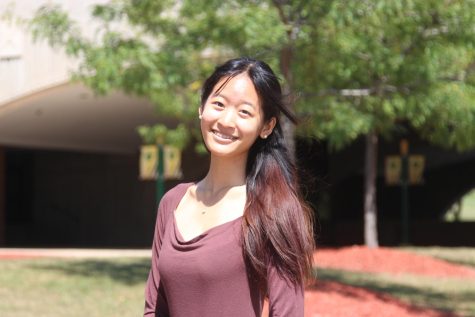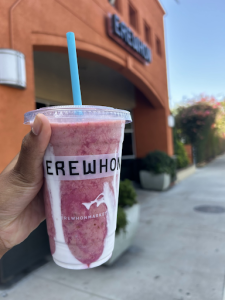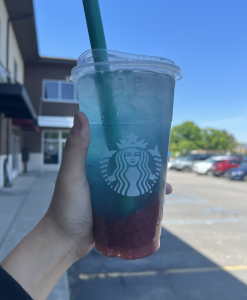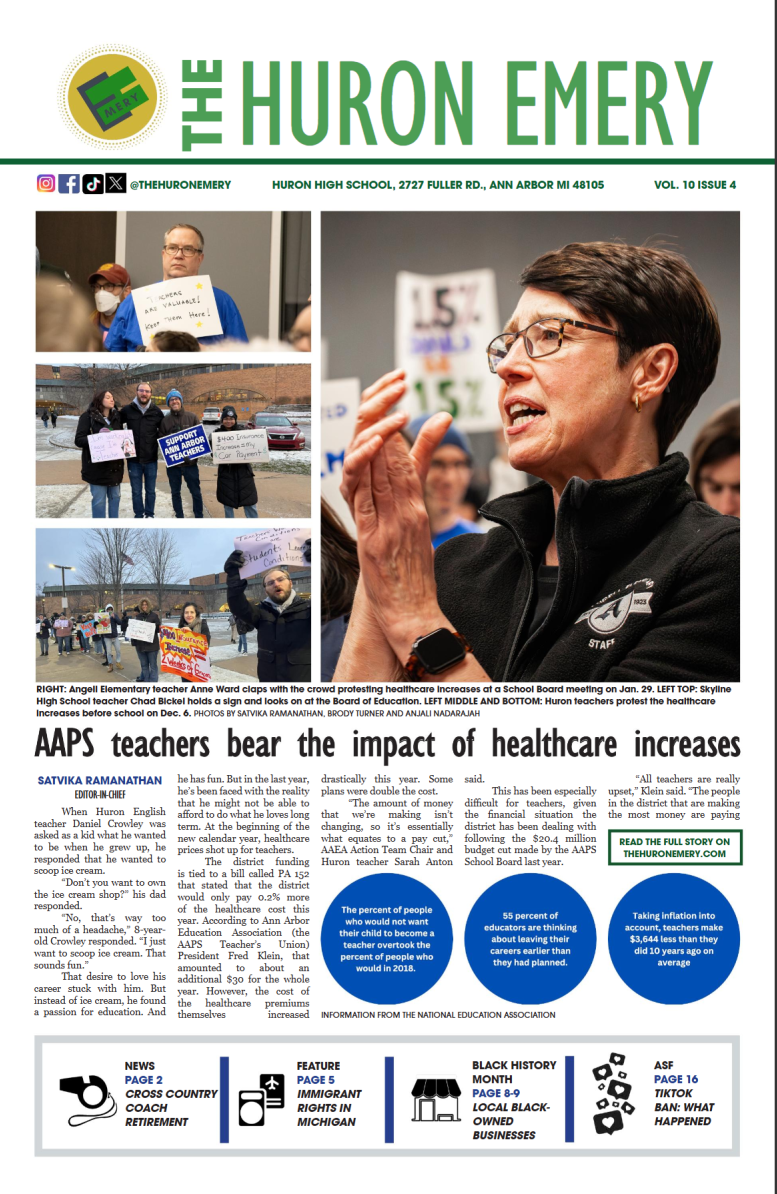How VanRiper’s postpartum struggles with motherhood led her to become a postpartum doula
After having had a difficult time postpartum with motherhood herself, VanRiper strives to become other new moms’ advocate through the profession of a postpartum doula.
August 30, 2021
Rachel VanRiper thought she was a bad mom.
When VanRiper’s son, Austin, was born, there was no euphoric connection.
“People paint this picture that as soon as you have a baby, you’re instantly bonded to them,” Huron special education teacher VanRiper said. “You’re expected to have that moment where your baby is on your chest and you’re like, ‘I’ve never loved anyone more.’ And I didn’t have any of that.”
VanRiper describes the feeling she had as babysitting someone else’s child.
“I very much wanted to take care of that kid,” VanRiper said. “I didn’t want anything bad to happen to him, but I didn’t have that I-love-you-so-much-I’ve-never-loved-anything-more feeling. And I felt very guilty over that.”
She thought she was doing something wrong. She thought she was a bad mom.
When VanRiper was pregnant, she had noticed an overwhelming amount of support.
“How are you feeling?” VanRiper’s mother-in-law would ask protectively.
“Put your feet up, honey,” VanRiper’s father would insist.
“Let me get that chair for you,” VanRiper’s mother said. “And is that the cushion you like?”
But after the baby was born, that attention stopped. It shifted to someone else.
“Can I hold the baby?” VanRiper’s mother-in-law asked expectantly.
“He is so cute,” VanRiper’s father gushed.
“Let me get that rattle for you,” VanRiper’s mother said. “Oh you want the other rattle?”
“You’re just sitting there on the sidelines and no one is paying attention,” VanRiper said. “You almost feel invisible. So I was struggling. Big time.”
At three weeks postpartum for VanRiper, who had a severe case of sleep deprivation, “it all just hit like a train wreck.”
“I was just kind of a disaster,” she said. “I couldn’t stop crying.”
The reason? The little things.
“It was the fact that I was a new mom,” VanRiper said. “I was stressed. I was overtired. And it all just happened overnight.”
Around that time, VanRiper spoke with a doctor and found out she was diagnosed with postpartum anxiety and depression.
“Once there was a name put to it, I felt like I could handle it,” she said. “I wasn’t just losing my mind.”
VanRiper also learned that the delayed bonding with a child was very common amongst other moms.
“That makes total sense because you wouldn’t just meet someone and you’re instantly like, ‘You’re my best friend. I love you. Let me do everything for you and tell you everything,’” VanRiper said. “And here I was, I had just met this new person, and I was expecting myself to just know everything he needed, wanted, thought, desired, all of that, but that takes time because I had to get to know him, a readjustment we don’t usually talk about as women.”
At one month postpartum, when VanRiper’s husband went back to work, she finally started to experience that I’ve-never-loved-anyone-more bond.
“Austin and I were just figuring it out together, and it felt like it was the first time that it was just the two of us,” VanRiper said. “I was like and still am today, ‘I’m obsessed with being your mom. I love you so much.’”
VanRiper found that a main factor that helped her overcome postpartum anxiety was the community of moms who wrapped their arms around her, assured her, nurtured her and listened. Even after her recovery, she wanted to immerse herself more in this community of women supporting women. Additionally, VanRiper wanted to be for other new moms the postpartum support she had not received. In fact, there’s a profession with that precise purpose: a postpartum doula. And VanRiper was determined to become one.
In March 2020, when the world shut down, VanRiper decided it was the perfect time to start her training. To become a doula, she had to attend a five-day program that ran from 8 a.m. to 5 p.m., “down to the minute.”
In July 2020, VanRiper received her postpartum doula certificate through Doulas of North America (DONA) International. Currently, she helps new moms primarily through virtual communication. Whether it be making late night phone calls for reassurance, writing out grocery lists or researching how to help the mom find out areas where they could receive additional support, VanRiper describes it as being a new mom’s advocate.
VanRiper also uses her Instagram account (deardoula_) to offer support to new moms. She started this account with the goal of providing moms with a supportive space and inclusive community of people when they are facing “difficult mom moments.”
VanRiper often posts about her experience having dealt with postpartum anxiety and the behind-the-scenes struggles of motherhood, always ending the caption with an encouraging phrase.
“Your anger is valid. Your pain is valid. Your frustration. Your hope. Your patience. You. All valid. We see you. We are saving space for you always,” one post from Apr 19, 2021 concluded.
“I agree with you 100 percent,” one user commented.
“I am 2 months in and I am feeling this deeply,” another follower added.
“For any mom of any age to be able to come to my page and be able to be like ‘Ah yes, that’s how I’m feeling’ is exactly what I want,” VanRiper said.
Recently, VanRiper got nominated as runner-up for “Family Favorites’ Doula” by the Ann Arbor Family Press.
“What? I am blown away to even be considered and so incredibly honored,” VanRiper responded to the news online with a red heart emoji at the end.
Currently, VanRiper is trying to become a state-recognized doula, meaning she would officially show up in the DONA International database as a postpartum doula. She is making her way down the 30 hours of work with a client and starting to read the dozen of books required to apply for certification.
“You don’t have to become state-recognized,” VanRiper said. “Some women never do. I’m working towards it because I think that it would make me feel better. If I was looking for a postpartum doula, I would prefer someone who was more credible and did this extra work.”
Though VanRiper hopes that her work as a doula can provide a more sustainable income, even if she didn’t earn a cent from this work, she would still do it.
“If I just had moms feel like they could be good moms then that’s enough for me,” VanRiper said. “It just feels good to let people know that they’re not alone.”
VanRiper’s son is turning two in September, and she attests they are “inseparable.” Austin always keeps track of where VanRiper is, following her around the house and exclaiming a playful “Oh hi Mama!” when he so-called accidentally finds himself in the same room as her.
“Once you’re a mom, you’re always a mom,” VanRiper said. “It can feel like a thankless job and lonely at times because you truly are just thinking about that person before yourself for the rest of your life.”



